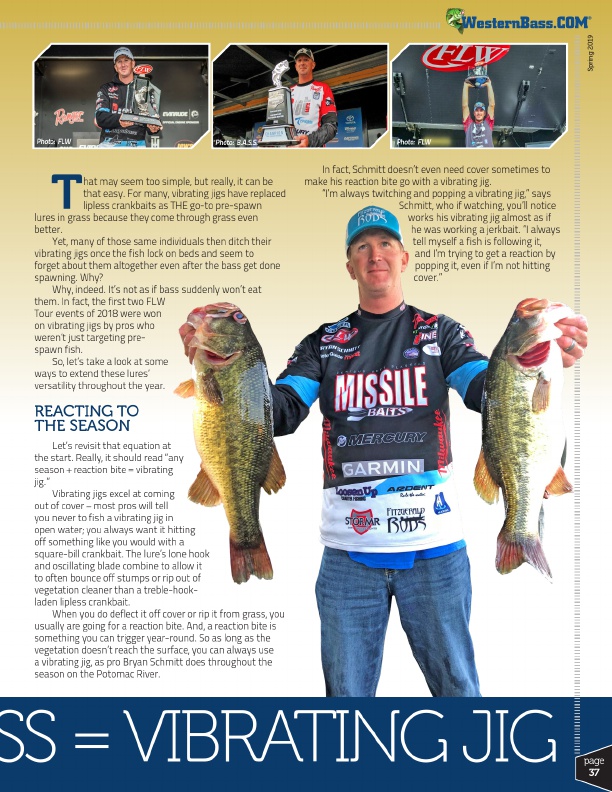
®
Spring 2019
Photo: FLW
Photo: B.A.S.S.
Photo: FLW
T
hat may seem too simple, but really, it can be
that easy. For many, vibrating jigs have replaced
lipless crankbaits as THE go-to pre-spawn lures in grass because they come through grass even
better.
Yet, many of those same individuals then ditch their
vibrating jigs once the fish lock on beds and seem to
forget about them altogether even after the bass get done
spawning. Why?
Why, indeed. It’s not as if bass suddenly won’t eat
them. In fact, the first two FLW
Tour events of 2018 were won
on vibrating jigs by pros who
weren’t just targeting pre-
spawn fish.
So, let’s take a look at some
ways to extend these lures’
versatility throughout the year.
REACTING TO THE SEASON
Let’s revisit that equation at the start. Really, it should read “any season + reaction bite = vibrating jig.”
Vibrating jigs excel at coming out of cover – most pros will tell you never to fish a vibrating jig in open water; you always want it hitting off something like you would with a square-bill crankbait. The lure’s lone hook and oscillating blade combine to allow it to often bounce off stumps or rip out of vegetation cleaner than a treble-hook- laden lipless crankbait.
When you do deflect it off cover or rip it from grass, you usually are going for a reaction bite. And, a reaction bite is something you can trigger year-round. So as long as the vegetation doesn’t reach the surface, you can always use a vibrating jig, as pro Bryan Schmitt does throughout the season on the Potomac River.
In fact, Schmitt doesn’t even need cover sometimes to make his reaction bite go with a vibrating jig.
“I’m always twitching and popping a vibrating jig,” says
Schmitt, who if watching, you’ll notice
works his vibrating jig almost as if
he was working a jerkbait. “I always
tell myself a fish is following it,
and I’m trying to get a reaction by
popping it, even if I’m not hitting
cover.”
SS = VIBRATING JIG p 3 ag 7 e